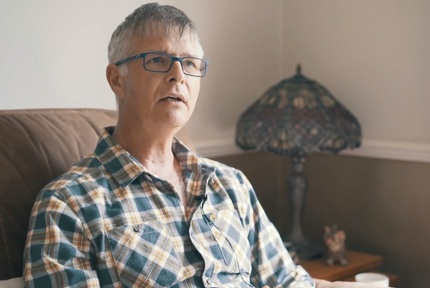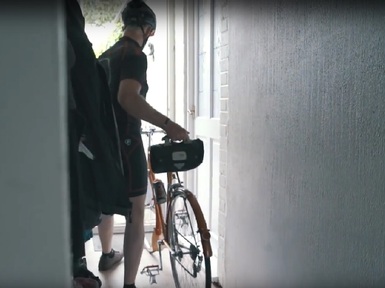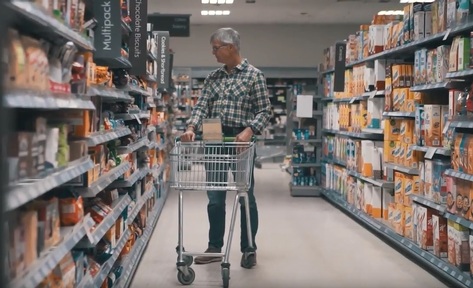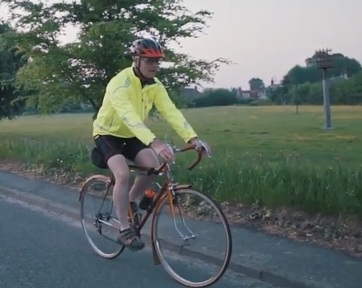'We kept it quiet for a whole year' says cyclist 'out and loud' about dementia
“Don’t keep it to yourself”, warns Peter Berry who is no longer afraid to say he has dementia and has even cycled 354.8 miles across the country to raise awareness.

Proving there is life after diagnosis, Peter was told by doctors he had early onset Alzheimer’s at the age of 50 but kept his friends in the dark about it.
Much later, he became all too aware of the repercussions of telling others he had dementia. “Some friends and family might disappear. Because they’re afraid and don’t understand”. But he reasons: “They will disappear anyway, whether now or two years later.”
‘Life would be better if I wasn’t here’
Explaining his reason for staying silent for so long, he says: “I felt guilty I was the hub of the family. That was wrong. Foolish.
“People wondered why I was not counting money, not driving, not going to parties? I thought no big deal.”
Actress Dame Barbara Windsor and her husband kept her dementia a secret for four years because they were worried about how people would respond. Only this year, did her husband publicly announce she had the condition.
Peter also came to the realisation that: “Dementia is like a moving target for people like me who are diagnosed”. The family man discovered dementia can rob a person of their financial as well as physical health. As the lynchpin and self-employed breadwinner of the family, he recalls: “I made many bad decisions in business.”

Young onset dementia affects more than 40,000 people in the UK under the age of 65 who are of working age and may still have families to support. Peter says: “The system is set up for people of a different generation. I used to run a business. I had to survive. I can’t get a pension.
“In the first year I became very depressed”. Given a life expectancy of eight years, he began to think “life would be better if I wasn’t here”.
Peter began to put down his thoughts and frustrations by writing a journal “until I couldn’t write anymore”. It was his daughter who suggested he try making a video diary with useful tips for others.
A whole year has gone by since he began his videos, talking to hundreds of strangers each week about his condition. Of his latest hobby, he says: “I thought the videos would help others. I never realised making them would help me. It’s given me a purpose in life.”
It also turns out Peter's dementia has led him to use technology “a lot more than I did.” He says someone losing their car keys is like a “little tiny snippet of what people like me live through every day”. The 52-year-old is therefore happy to speak to people every week with video diaries filmed from his home in Suffolk, on topics that include how he uses his mobile as a visual memory.
After buying a gift for his wife, Peter became fearful he would forget when the time came to give it to her, so he took a photograph of it in an open drawer. When the day arrived to give the present, his wife reminded him to go through his phone to find the image of the gift's location.
Peter can also go to his local shop and have no idea he’s ever been there before or where anything in the shop is, and so he takes a photograph of it.
Having stopped driving because of his condition, Peter makes sure he always puts his bike in the same place outside the shop, because when he exits the shop, he doesn’t remember how he got there. He may think he came with his wife in the car, but when he spots his cycle he remembers.

Cycling helps me ‘leave dementia at home’
He says: “Alzheimer’s is sitting on my shoulder whispering in my ear. When I go cycling, I leave my dementia sitting at home on the sofa. I become the person I was.”
Peter's love of cycling helped him come up with the idea of cycling across the country from Aberystwyth in Wales to Aldeburgh in Suffolk “to challenge my dementia and inspire others to get up and do things”. The effort also “gave me the kick up the backside I needed”.
One-legged race
The 52-year-old’s peddling power over six days clocked up 354.8 miles and has raised money for Young Dementia UK, while earning the nickname ‘Peddlin’ Pete’.
In stifling hot temperatures of 32C in the shade, Peddlin’ Pete completed his epic ride across Britain but a knee injury, meant he had to cycle the final section of the race using only one leg.
He says: “There were some days that I think were very difficult for me. Cycling along the canal path and trying to focus on a very small path with an unruly hedge one side and a very deep canal with a few shopping trolleys in on the other side.”
‘Glass overfull’

Peter also got support from cycling volunteer Jan Dodd, whose husband has Alzheimer’s. As navigator, Jan Dodd prompted him to stay hydrated and organised the cycling route. “Without her, I would not have been able to navigate my way back.”
When a cyclist stopped peddling and exited the race, he says: “When Christina pulled out, I was adamant I was going to do it.” Peter's attitude to the cycling challenge is similar to his new attitude to dementia. He describes himself as seeing his glass as “over full” as opposed to half full or half empty.
“Maybe it makes me a little stronger if I can leave dementia at home. It caught up with me on a few occasions but most of the time I left it home. It’s important to realise that life is not over with dementia. It’s just a little different and we still can achieve. Everyone should be able to leave their dementia at home.”
His efforts to highlight how dementia is not just a disease of the elderly has seen him not only make dementia diaries and complete his cycle challenge but also give talks up and down the country.
Peter's speech at this year’s Alzheimer’s Show, led to enthusiastic applause for him, who then shocked his audience with the words: “You know I’ve absolutely no idea what I just said." Before adding: "But by the looks on your faces I’ve done a good job.”
Peter shares his tips with the public on how he lives with dementia in his weekly online dementia videos.
You can watch Peter’s YouTube Channel here.
To donate to Peter’s cycle challenge click here
Latest Features News
 28-Nov-19
2019 Election: Labour pledges £10.8 bn for free personal care while Boris Johnson sidelines social care
28-Nov-19
2019 Election: Labour pledges £10.8 bn for free personal care while Boris Johnson sidelines social care
 18-Oct-19
Podcast: Wendy Mitchell and dementia: 'My biggest fear is not knowing who my daughters are'
18-Oct-19
Podcast: Wendy Mitchell and dementia: 'My biggest fear is not knowing who my daughters are'
 30-Sep-19
World's oldest diver aged 96 says 'never accept the fact you are getting old'
30-Sep-19
World's oldest diver aged 96 says 'never accept the fact you are getting old'
 27-Sep-19
Exclusive: Care minister backs care workers' call for time off to grieve and attend funerals
27-Sep-19
Exclusive: Care minister backs care workers' call for time off to grieve and attend funerals
 20-Sep-19
Podcast: Gyles Brandreth urges care workers to learn poetry with elderly
20-Sep-19
Podcast: Gyles Brandreth urges care workers to learn poetry with elderly